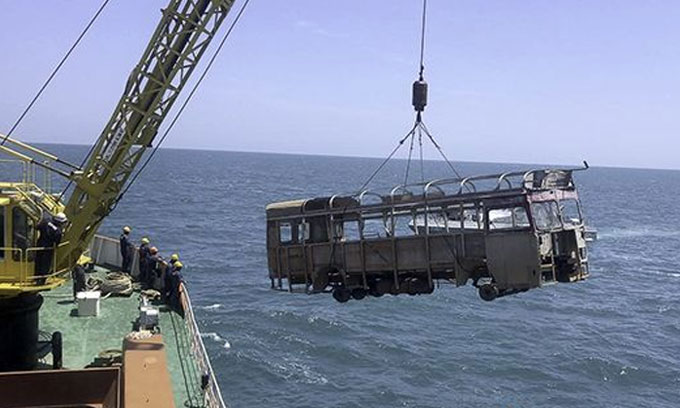(UTV | COLOMBO) – Fishermen in Tamil Nadu have objected to Sri Lanka’s initiative to submerge discarded vehicles into Sri Lankan waters, saying their fishing would also be affected, the New Indian Express reported. Experts from India also called the move ‘irresponsible’.
On June 11, the Department of Fisheries and Aquatic Resources, in collaboration with the Sri Lankan Navy, submerged 20 degraded and discarded buses near Delft Island (‘Neduntheevu’) in its northern waters (‘Palk Strait’).
The move was termed by Sri Lanka as one ‘to help create artificial reef conducive to the marine environment’. Tamil Nadu fishers condemned it, saying it will affect their livelihood.
The submersion on June 11 was not the first. Sri Lanka has been dropping discarded vehicles for a while. The points of drop are in Sri Lankan waters. Yet, still, Tamil Nadu fishers are concerned.
“What is the guarantee that the vehicles will not get drifted underwater, will move towards the Indian waters across International Maritime Boundary Line (IMBL) and deposited at the bottom of our waters? We saw the Tsunami washing up such objects for several miles and depositing them near our shore in December 2004. Our fishing will get affected. We request the state government to stop this outrageous move and save our waters, our shore and our fishing,” said RMP Rajendra Nattar, a fisher-representative from Nagapattinam.
Trawling continues to the primary fishing practice for Tamil Nadu fishers, whereas it is banned in Sri Lanka. Tamil Nadu fishers trawl in Coramandel Waters, Palk Strait and Gulf of Mannar, which Sri Lanka also shares. The trawl nets can reach midwater and even the bottom of the sea. Tamil Nadu fishers fear that their trawl nets will get stuck in the submerged vehicles and damaged. They also call the move against India–Sri Lanka maritime boundary agreements (1974 – 1976).
The experts approve the reasoning behind the concern of Tamil Nadu fishers. Dr K Murali, the Head of Ocean Engineering Department in IIT – Madras, said, “The drifting of unsupported objects under the water, due to ocean currents is a real phenomenon. The drifting of debris of the aeroplane MH 370, which crashed in 2014, is an example of drifting induced by ocean currents. The debris drifted for hundreds of kilometres. Natural disasters like tsunamis and cyclones can drastically augment drifting.“
Tamil Nadu and Puducherry government collaborate with institutes like Central Marine Fisheries Research Institute (CMFRI) and M S Swaminathan Research Foundation (MSSRF) like has been dropping structures in the sea for past two decades. The dropped blocks had become ‘artificial reefs’ over months and promote marine life, the idea which Sri Lanka is trying to explore through discarded vehicles. Dr H Mohamad Kasim, a retired principal scientist from CMFRI, said, “We spent a lot of research before deploying reef blocks. We analysed the seabed conditions. Each structure we dropped were only about three feet in height, weighed almost a ton and made of hard concrete. We dropped around 200 permeable and hollow blocks closely in deeper points. Thus, we deployed those reefs that and made them resistant against drifting or displacement. But, the vehicles are not similarly designed for this purpose. They can be overturned and washed away easily through strong ocean currents due to their structural disadvantages.”
The experts also call the dumping of vehicles disastrous for the environment and are against the ‘international laws on anti-dumping. Dr S Velvizhi, the Head of MSSRF- Fish for All Research Centre in Poompuhar, added, “Reefs formed out of concrete blocks are harmless to the ecosystem and is favourable to marine life. But, the bodies of vehicles Sri Lanka is dumping are made of corrosive metal materials. Metal rust is toxic to marine life. ‘Fish schools’ move indiscriminately in the sea across boundaries, so the point of metal dumping is irrelevant. Our seafood through fishing could thus become poisonous. Sea is not a ground for irresponsible dumping, above all.”
The Directorate of Fisheries in Tamil Nadu told The New Indian Express that they have responded to the Sri Lankan initiative. Director M Karunakaran IAS said, “We have received information in the regard through various media sources. We have urged the Tamil Nadu state government to bring it to the notice of the Union Government to stop the Sri Lankan initiative.“



